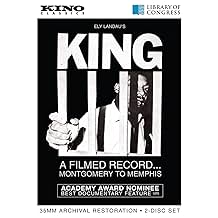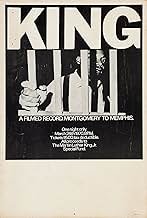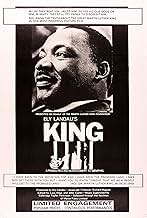King: de Montgomery à Memphis
Original title: King: A Filmed Record... Montgomery to Memphis
- 1969
- 3h 5m
IMDb RATING
8.2/10
684
YOUR RATING
Follows Martin Luther King's life and decades-long civil rights activism.Follows Martin Luther King's life and decades-long civil rights activism.Follows Martin Luther King's life and decades-long civil rights activism.
- Directors
- Writers
- Stars
- Nominated for 1 Oscar
- 1 win & 1 nomination total
Martin Luther King
- Self
- (archive footage)
Ralph Abernathy
- Self
- (archive footage)
James Baldwin
- Self
- (archive footage)
Tony Bennett
- Self
- (archive footage)
Leonard Bernstein
- Self
- (archive footage)
Marlon Brando
- Self
- (archive footage)
H. Rap Brown
- Self
- (archive footage)
- Directors
- Writers
- All cast & crew
- Production, box office & more at IMDbPro
Featured reviews
I'm not sure this is an actual documentary. It has no editorial or narrative structure per se, what it presents us with is as comprehensive a chronology of Dr. Martin Luther King as it is possible to get. From his humble beginnings in an Alabama ridden with bigotry and strife, through to his assassination in 1968, this uses a phenomenal amount of archive research to illustrate the power of his oratory. His speeches are powerful and emotional, but they never come across as angry or provocative of violence. His strength of character and purpose in the face of a long-established racial belligerence is really quite well captured as the film includes the large scale "I Have a Dream" set-pieces to far more intimate and poignant comments to smaller groups, churches or even just to his aides and friends as he travels the length and breadth of the country extolling the virtues of freedom for all. That all isn't just for folks of colour, but those being persecuted for their religious beliefs too, or being disadvantaged because of their sex or social status. It's hard to imagine who might actually watch all of this now, it is a long haul, but it goes quite some way to testifying just how effective oratory can be when delivered confidently and proudly to an audience eager to engage. There is enough annotation to help advise on the locations and timelines, and there are a few - slightly unnecessary, I felt - staged readings from the likes of Charlton Heston and James Earl Jones to help, as does the latter archive footage, demonstrate that his optimism wasn't just inspiring those African Americans, but plenty from the descendants of it's European immigrant population too. It doesn't attempt to analyse the man, his motives or his personal life but I don't think that was anyone's plan. It's a vehicle for his passion, and it works powerfully.
It's a documentary of Martin Luther King, Jr.'s life from 1955 to his death in 1968. Except for his first speech at the beginning of the Montgomery Bus Boycott, it is primarily news footage and coverage of his best-known activities during those years and the local circumstances that brought about those activities. The Montgomery speech is audio only. That is both its strength and limitation.
This film is one of the few places you can still see and hear the entirety of King's "I Have a Dream" speech of 1963. There are numerous other memorable speeches; seeing him deliver them visually dramatically increases the impact. It is so focused on King, however, that you don't get an overview of the Civil Rights movement, especially those parts in which he had a limited profile, such as the Freedom Rides in 1961.
There is nothing about King's personal life or the work of his associates. To get better context, you need the background of a good biography like Jonathan Eig's "King: a Life." But to be bathed in M. L. King's oratory, this three-hour film is the place to go.
Some celebrities narrate brief segments intermittently. They are a distraction and add nothing.
This film is one of the few places you can still see and hear the entirety of King's "I Have a Dream" speech of 1963. There are numerous other memorable speeches; seeing him deliver them visually dramatically increases the impact. It is so focused on King, however, that you don't get an overview of the Civil Rights movement, especially those parts in which he had a limited profile, such as the Freedom Rides in 1961.
There is nothing about King's personal life or the work of his associates. To get better context, you need the background of a good biography like Jonathan Eig's "King: a Life." But to be bathed in M. L. King's oratory, this three-hour film is the place to go.
Some celebrities narrate brief segments intermittently. They are a distraction and add nothing.
We just passed what would've been Martin Luther King, Jr.'s 90th birthday, so I decided to watch this documentary. You've heard about Martin Luther King, Jr. You've probably seen footage of some of his speeches. But to truly understand him, you have to see Sidney Lumet's Academy Award-nominated "King: A Filmed Record... Montgomery to Memphis". Originally screened as a one-night event, it's now available for home viewing. The documentary consists of footage of King starting with the bus boycott in Montgomery until his funeral, emphasizing how he called upon the United States to live up to the ideals that it professed. Whether addressing racial and class issues or coming out against the Vietnam War, he was on the front lines of justice every step of the way.
The documentary includes footage of people (Harry Belafonte, Ruby Dee, Paul Newman, Joanne Woodward, etc) quoting King. It emphasizes the diversity of people who stood on the side of morality. In an era when we see racism coming back to the fore - pushed by the current demagogue-in-chief - it's more important than ever to understand King's legacy. Definitely see this documentary.
The documentary includes footage of people (Harry Belafonte, Ruby Dee, Paul Newman, Joanne Woodward, etc) quoting King. It emphasizes the diversity of people who stood on the side of morality. In an era when we see racism coming back to the fore - pushed by the current demagogue-in-chief - it's more important than ever to understand King's legacy. Definitely see this documentary.
More than half a century after Dr. Martin Luther King Jr. was murdered, I finally looked at this movie. It is a collection of Dr. King's appearances and the events around him, interspersed with celebrities of the day speaking in admiration, edited by two of the leading film makers of the day with the assistance of two editors, attempting to make coherent sense of what, half a century later, is a senseless and evil situation and the effort to remedy it.
It's a huge effort, and brilliantly produced. "How Did We Get Here?" is a question that needs to be examined, if only for its cautionary value.
I looked at this off a TV presentation, skipping the commercial interruptions. I did notice the note "Viewer Discretion Warranted." I suppose people think truth is something people need to be discreet about. Recent events indicate that people have let the lessons I learned as a child drop out out their thoughts, and thereby permitted these hateful actions return. Yes, discretion is required. Otherwise people might remember, and remain silent about them.
It's a huge effort, and brilliantly produced. "How Did We Get Here?" is a question that needs to be examined, if only for its cautionary value.
I looked at this off a TV presentation, skipping the commercial interruptions. I did notice the note "Viewer Discretion Warranted." I suppose people think truth is something people need to be discreet about. Recent events indicate that people have let the lessons I learned as a child drop out out their thoughts, and thereby permitted these hateful actions return. Yes, discretion is required. Otherwise people might remember, and remain silent about them.
Compiled from newsreel footage and interspersed with celebrity commentary, this film has a heavy impact, showing Rev. King, not as a saint, but as a compassionate man of God with great goals for all people. The film quality is rather rough at times, and the racial slurs shouted are harsh, but the film is powerful. Recommended for those who seek an insight to the man behind the dream.
Did you know
- TriviaThis film originally was shown at theaters as a "one-time-only" event on 24 March 1970 and ran 3 hours and 5 minutes. The proceeds from the $5 admission price were donated to the Dr. Martin Luther King Jr. Special Fund. It was later shown on US television, unedited and with limited interruption.
- Alternate versionsA second version, edited down to 103 minutes, was released onto videotape. It is missing the celebrety narratives and an opening montage of clips of militant black leaders with violent rhetoric contrasting to clips of Dr. King's non-violent messages, but includes the original introduction by Harry Belefonte, and consists entirely of newsreel footage.
- ConnectionsFeatured in C'est assez noir pour vous?!? (2022)
Details
- Release date
- Country of origin
- Language
- Also known as
- King: A Filmed Record... Montgomery to Memphis
- Filming locations
- Production company
- See more company credits at IMDbPro
- Runtime
- 3h 5m(185 min)
- Color
- Sound mix
- Aspect ratio
- 1.37 : 1
Contribute to this page
Suggest an edit or add missing content








































